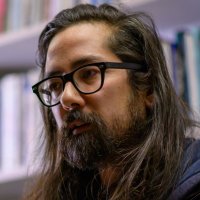
I go for long stretches without writing poems. It is, for me, an important part of being a poet; it allows poetry to grow. I didn’t write poems for most of 2023. Then on October 8, my grandmother, June Chizuko Yamashita Shimoda, died. The night before, I went to sleep to the image of a bulldozer breaking through a tall fence, razor wire, dust, Palestinians running through the breach, a blue sky. The next morning my grandmother was dead. She died at three in the morning. I put myself together and wrote a poem for her that night, then every night for forty-nine nights (the Buddhist period of mourning). Writing poems for my grandmother was a way to talk to her about the world she was leaving behind. Poetry was, then, a way of providing—or trying to provide—consolation. It was also a way of paying respects. It’s not about finding a way into or back into writing, or about inspiration or being inspired. It’s about responsibility. Sometimes writing is just work. And sometimes the work is staying up, keeping watch and keeping time, and doing the little we can to help the dead transition into their afterlife.
—Brandon Shimoda, author of The Afterlife Is Letting Go
(City Lights Books, 2024)
Photo credit: Scott Tsuchitani






